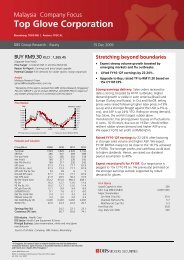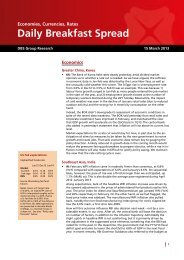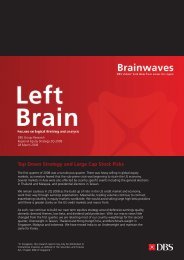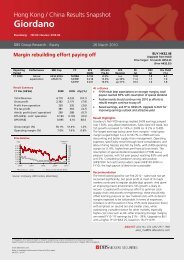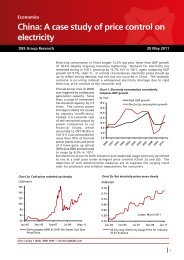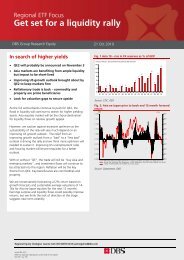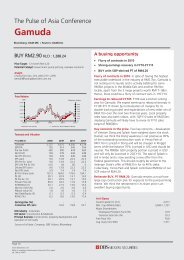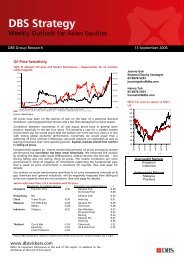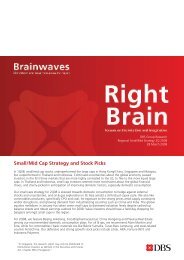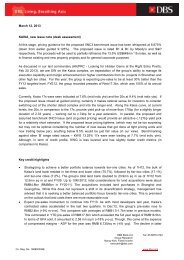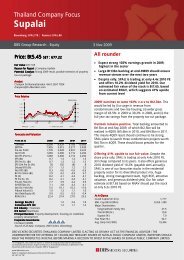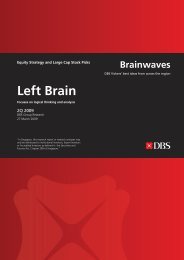Left Brain Right B - the DBS Vickers Securities Equities Research
Left Brain Right B - the DBS Vickers Securities Equities Research
Left Brain Right B - the DBS Vickers Securities Equities Research
Create successful ePaper yourself
Turn your PDF publications into a flip-book with our unique Google optimized e-Paper software.
Regional Equity Strategy 4Q 2009<br />
Strategy Overview: Asia Equity<br />
7. Timing is <strong>the</strong> soul of investing in China and some<br />
investors hype it with China's 60th party anniversary<br />
celebration. Our belief is that China will continue<br />
with its reform policy and Premier Wen Jiabao made<br />
it very clear during <strong>the</strong> Davos speech that <strong>the</strong> fiscal<br />
stimulus is not about US$4t spending but a stimulus<br />
programme to encourage domestic investment and<br />
spending that would benefit China in <strong>the</strong> long term.<br />
Not forgetting that China's exports demand should<br />
also start to shift to recovery mode which would<br />
accelerate China's growths in <strong>the</strong> next few quarters.<br />
8. There are signs that <strong>the</strong> USD may start to weaken as<br />
<strong>the</strong> recovery matures into <strong>the</strong> growth stage from <strong>the</strong><br />
"worst is over" stage. This should allow for Asian<br />
currency appreciation. At this juncture, our currency<br />
strategist expects Asian central banks to slow <strong>the</strong><br />
appreciation pace of <strong>the</strong>ir currencies and maintain a<br />
modest USD depreciation profile. A weak USD<br />
should favor commodities and Asian asset markets<br />
9. With <strong>the</strong> abundant liquidity around, we believe<br />
investors will be chasing for higher yields. Against<br />
this backdrop, carry trades and high risk appetite<br />
should favor Asian assets.<br />
10. We are uncomfortable with <strong>the</strong> recent sharp rise in<br />
<strong>the</strong> gold price:- It may be signaling an increase in<br />
risk aversion or a rising fear of inflation, or <strong>the</strong><br />
collapse of <strong>the</strong> USD. All of which will add volatility<br />
and will not be positive for Asian stock markets.<br />
Asset allocation strategy<br />
The coincident relationship between economic and stock<br />
market cycles suggests that upward momentum will continue<br />
as long as <strong>the</strong> economy remains on track. The powerful impact<br />
of <strong>the</strong> synchronised global upturn could be under-estimated<br />
<strong>the</strong> same way <strong>the</strong> synchronised global downturn came along.<br />
We believe markets have <strong>the</strong> propensity to touch <strong>the</strong> pre-crisis<br />
high levels. A clearing level would be for Asia earnings to<br />
return to pre-crisis levels by 2010 as we have forecast for GDP<br />
levels to return to pre-crisis levels by end 2010. We arrive at<br />
2010 year end targets using this assumption.<br />
We acknowledge that Asia's valuations are getting stretched<br />
and investors may be concerned about <strong>the</strong> withdrawal of<br />
stimulus packages and formation of asset bubbles in Asia.<br />
Given <strong>the</strong> strong rally in <strong>the</strong> last six months, <strong>the</strong>se worries may<br />
serve as reasons for profit taking. Support levels using P/B at<br />
one standard deviation calculations show correction may not<br />
be severe. We recommend staying invested but re-jig <strong>the</strong><br />
portfolio to exploit <strong>the</strong> risks and opportunities in <strong>the</strong> coming<br />
quarter.<br />
We are making <strong>the</strong> following changes to our market strategy:-<br />
a. Reduce our overweight in Hong Kong and China 'H'<br />
to Neutral to mitigate China's macro policy risk<br />
b. Reduce Singapore overweight to a slight overweight.<br />
Early signs of housing bubble and government's<br />
intervention may dampen positive sentiments in <strong>the</strong><br />
Singapore market in <strong>the</strong> short term. Like Hong Kong<br />
and China 'H', <strong>the</strong>se high beta markets have returned<br />
in excess of 80% from <strong>the</strong> low on 9th March and will<br />
be more prone to profit taking. Our slightly<br />
overweight position is maintained on Singapore over<br />
Hong Kong due to its cheaper valuations and strong<br />
re-rating drivers in <strong>the</strong> coming quarter - a correction,<br />
if any, will see Singapore holding better than Hong<br />
Kong<br />
c. We raise Taiwan and Korea to Overweight in view of<br />
<strong>the</strong> synchronised global upturn. Taiwan and Korea<br />
stock indices are heavily weighted towards Industrials<br />
and Technology which will benefit from <strong>the</strong> upturn. A<br />
stronger won forecast now also justifies <strong>the</strong> Korea<br />
upgrade. Our preference in Taiwan over Korea is<br />
maintained due to higher policy risk in Korea and<br />
Taiwan's cheaper valuations (based on historical<br />
standards). Taiwan's cyclical sectors like Chemicals,<br />
Industrials, Telcos, Banks and Technology were<br />
captured in <strong>the</strong> attractive P/B sector screen. Re-rating<br />
potential in Taiwan is higher due to improving crossstraits<br />
relationships while <strong>the</strong> North Korea threat will<br />
always linger.<br />
d. We raise Thailand to Overweight on <strong>the</strong> back of<br />
attractive valuations. Big sector weights like Banks and<br />
Oil & Gas sectors are still good value plays<br />
e. We continue to believe in <strong>the</strong> longer term higher<br />
potential growth of Indonesia and that <strong>the</strong> market can<br />
re-rate fur<strong>the</strong>r despite an already consensus<br />
overweight position and higher valuations. The lower<br />
interest rate and inflation scenarios may set ano<strong>the</strong>r<br />
growth regime for Indonesia on <strong>the</strong> back of a<br />
constructive political environment. World Bank<br />
recently upgraded Indonesia's GDP growth forecast to<br />
6.5% next year, which will be near its potential level.<br />
Indonesia's valuations, though high, are still<br />
comparable with China's and India's - <strong>the</strong> o<strong>the</strong>r two<br />
high growth economies in Asia. This quarter ,<br />
however, we reduce it from Overweight to Neutral on<br />
a tactical move to exploit better opportunities<br />
elsewhere.<br />
Page 14



